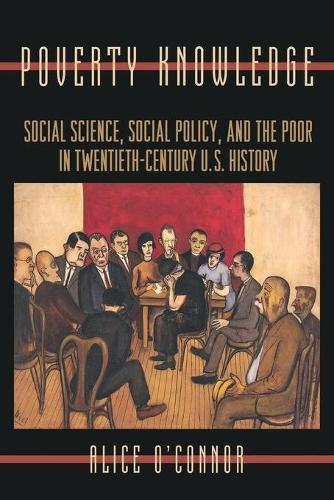
Poverty Knowledge: Social Science, Social Policy, and the Poor in Twentieth-Century U.S. History
(Paperback)
Publishing Details
Poverty Knowledge: Social Science, Social Policy, and the Poor in Twentieth-Century U.S. History
By (Author) Alice O'Connor
Princeton University Press
Princeton University Press
11th November 2002
United States
Classifications
Professional and Scholarly
Non Fiction
Social and cultural history
History of the Americas
History of ideas
362.50973
Short-listed for Choice Magazine Outstanding Reference/Academic Book Award 2001
Physical Properties
Paperback
392
Width 152mm, Height 235mm
567g
Description
Progressive-era "poverty warriors" cast poverty in America as a problem of unemployment, low wages, labor exploitation, and political disfranchisement. In the 1990s, policy specialists made "dependency" the issue and crafted incentives to get people off welfare. Poverty Knowledge gives the first comprehensive historical account of the thinking behind these very different views of "the poverty problem," in a century-spanning inquiry into the politics, institutions, ideologies, and social science that shaped poverty research and policy. Alice O'Connor chronicles a transformation in the study of poverty, from a reform-minded inquiry into the political economy of industrial capitalism to a detached, highly technical analysis of the demographic and behavioral characteristics of the poor. Along the way, she uncovers the origins of several controversial concepts, including the "culture of poverty" and the "underclass."She shows how such notions emerged not only from trends within the social sciences, but from the central preoccupations of twentieth-century American liberalism: economic growth, the Cold War against communism, the changing fortunes of the welfare state, and the enduring racial divide. The book details important changes in the politics and organization as well as the substance of poverty knowledge. Tracing the genesis of a still-thriving poverty research industry from its roots in the War on Poverty, it demonstrates how research agendas were subsequently influenced by an emerging obsession with welfare reform. Over the course of the twentieth century, O'Connor shows, the study of poverty became more about altering individual behavior and less about addressing structural inequality. The consequences of this steady narrowing of focus came to the fore in the 1990s, when the nation's leading poverty experts helped to end "welfare as we know it." O'Connor shows just how far they had traveled from their field's original aims.
Reviews
One of Choice's Outstanding Academic Titles for 2001 "In this thoroughly researched and clearly written book, O'Conner offers a comprehensive look at the changing ways American experts have thought about poverty in the 20th Century... A rewarding read..."--Library Journal "O'Connor provides the most up-to-date history of poverty and welfare in the US in this highly recommended [book]... Her argument is unique, controversial, and convincing."--Choice "Poverty Knowledge has many strengths. It is a well-written analysis by a historian with substantial experience in the not-for-profit organizations that funded and substantively influenced much of the production of poverty knowledge over the past two decades... The descriptive materials alone will make this book an essential addition to the history of the social sciences... [It] will be essential reading for historians of the social and policy sciences."--Robert F. Kelly, Contemporary Sociology "O'Connor's book surpasses previous accounts of American approaches to poverty and makes a very significant contribution to critical writing on the welfare state."--Ruth Crocker, American Historical Review "A book that should be read by everyone engaged in poverty knowledge and social policy."--Deborah L. Little, American Journal of Sociology "This deeply researched and panoramic book is intellectual history at its best."--Thomas Jackson, The Historian "A brief review cannot do justice to the richness and subtlety of this fine study... [O'Connor's] argument is on the whole deeply compelling: over the course of the twentieth century, poverty knowledge became, despite the best intentions of its liberal practitioners, a partisan tool for those seeking to control, marginalize, or dismiss the claims of the poor, not for those working to end poverty."--Sonya Michel, Isis
Author Bio
Alice O'Connor was formerly the Assistant Director of the Project on Social Welfare and the American Future at the Ford Foundation, the Director for the Programs on Persistent Urban Poverty and International Migration at the Social Science Research Council, a National Science Foundation Postdoctoral Fellow at the University of Chicago, and a Visiting Scholar at the Russell Sage Foundation. She is currently Associate Professor of History at the University of California, Santa Barbara.
